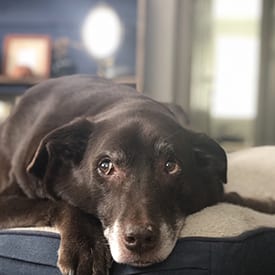Do you have a dog? Is he getting a little bit older? Do you find yourself noticing more signs of aging in your furry friend? As a dog owner, it’s tough to see your canine companion getting older. However, this is a part of his life, and it’s important for you to know how to help him every step of the way.
In this article, we’ll show you tips for caring for senior dogs in Miami, FL. This information can help you get started and recognize what to expect as your dog ages, too.
 Prepare for Mobility Issues
Prepare for Mobility Issues
Many dogs develop mobility issues later in their lives, and arthritis is common in older dogs. These issues may make it harder for your dog to get up out of bed quickly or may impede his ability to run and play like he used to.
If your dog seems stiff or appears to be in pain when he moves, speak to your veterinarian for information regarding pain relievers that might help him. You may also choose to take him to physical therapy or work out a gentle exercise routine at home that can help him stay more mobile with less pain.
Expect Some Vision and Hearing Loss
Not every dog will have vision loss or hearing loss as he gets older, but many do. Fortunately, dogs require their sense of smell much more than sight or hearing, so they can still navigate familiar spaces even if they lose one or both functions as they get older.
You may notice cataracts on your dog’s eyes in his later years. Cataracts can cause dogs to see shadows or blurs that aren’t really there and can sometimes make dogs more nervous because of this. Speak to your vet for more information if you see cataracts on your dog’s eyes.
Understand Memory Problems
Many older dogs develop dementia as they age. Early signs of dementia include fear of situations that should be familiar or even comforting to them, as well as standing around blankly as if they have forgotten what they were doing.
Later, as the disease progresses, dogs may forget where they are entirely or may have trouble recognizing their favorite family members. Sadly, there is no cure for dementia in dogs, just like in humans. Your vet can work with you to figure out the best course of action if your dog is suffering from dementia.
Work on Weight
It’s important to make sure your dog maintains a healthy weight in his older age. Older dogs are less active than young dogs, so it doesn’t take long for them to put on weight. You may also be tempted to feed your dog more as a means of comforting or soothing him but try to refrain from doing this.
There are plenty of specially formulated food blends designed for senior dogs. Choose one of these to ensure your dog is getting everything he needs in his diet. The right food for a senior dog can help him feel better and fight signs of aging.
Look for Lumps
Sadly, many older dogs are prone to developing cancerous tumors. Cancer can show up at any point in a dog’s life, but older dogs frequently have at least one tumor. Be on the lookout for lumps on your dog’s skin or any tender areas that may be hiding a tumor.
If you think your dog may have a tumor, or if you find a lump on his body, speak to your veterinarian right away. Depending on your dog’s age and physical condition otherwise, there may or may not be a treatment option that can work. Your vet will give you more information.
Create an Incontinence Plan
Understand that your dog is likely going to develop incontinence as he gets older, just as humans do. Create a plan with other members of your household to help deal with this problem.
For example, you may explain to your family that they must drop what they’re doing and take the dog out the moment he walks toward the door, rather than waiting too long. You may also work out a rotating schedule with your household, letting everyone know they will need to pitch in and help clean up after your dog when accidents happen. Never punish your dog for incontinence.
Talk with Your Vet About Your Senior Dog in Miami, FL
Just because your dog is getting older, that doesn’t mean he can’t still live a well-rounded and fulfilling life. Take time to figure out a game plan for your dog as he moves into the senior phase of his life and call (305) 663-3300 or book an appointment online to talk with your vet at Country Club Animal Hospital for more information.
This is a time when it’s crucial to have a strong relationship with your vet. This way, you can always ask for assistance with any problems or concerns that arise with your aging dog.
